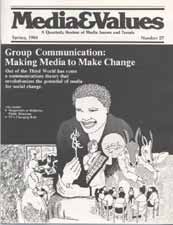Challenge of Group Media, The
|
This article originally appeared in Issue# 27
|
From the Third World comes a powerful new approach to education in a media age
From Nigeria to Indonesia a new approach to communications has emerged in the past decade.
Called "group media" or 'group communication" the emphasis is less on the media PRODUCT (whether newspaper, video production or puppet show) and more on the PROCESS that happens when a group of people use a media experience to uncover new insights about themselves and their relationships — to one another, to their social, political or economic condition, even to their God.
Group media, as a category in the communications field, has emerged out of the use of communications for education, particularly development communications in Third World countries.
While First World educators were struggling to integrate "audio-visuals" into their teaching, Third World teachers were faced with different concerns, not the least of which was the thorny issue of development itself and how much of Western "progress" was indeed progress to countries whose economic, political, social and religious culture is vastly different from that of North America or Europe.
But the development of group media as a communications process is much deeper than the question of appropriate technology or cultural imperialism. The link between media and learning goes to the very core of the human person — and each person's ability to reach his or her full potential as a human being and child of God.
As many a classroom teacher has learned, media tools, in themselves, are not magic swords to cut through inertia, distraction or low ability. A media experience can be just as poor a teacher as a human one if it is used without thought or preparation.
What the development of group media has shown, however, is that the PROPER use of a mediated experience in a group of motivated students can unleash a powerful learning curve, one that can influence for a lifetime the way people view themselves and their place in the world.
Based on the pedagogical principles of Paolo Friere, who proposed that education is really "conscientization" or the process of becoming aware of oneself and one's real situation and learning, therefore, to take charge of one's life, group media is a valuable contribution to both education and communication theory in today's Media Age.
It questions the dominance of mass media and counters the passivity, individualism and isolation fostered by one-way, top-down communication. It places media in the hands of the many instead of the few and views communications as a liberating rather than a manipulative force.
Developed particularly by religious groups (both Catholic and mainline Protestant) group media has contributed dramatically to the contemporary redefinition of evangelization and religious education by providing creative experiences and reproducible formats that link liberation and development to the formation of conscience and the nurturing of faith. In countries where group media is practiced widely, communicators are valued members of any ministerial team.
Interestingly, group media is beginning to be talked about in the United States, Canada and other First World countries. After decades and centuries of exporting "our" developments to "them," we now have much to learn about the potential of communications for human growth and community development - if it's not already too late for our media-saturated structures to comprehend.
The one group in the First World that is probably most prepared for group media is religious educators. Long influenced by Friere, teachers in most major denominations have done much already to integrate a process approach into everyday religious education.
But all of us whose task is in some way to educate, to "bring out a latent potential" in others — from nuclear freeze proponents to advocates for the rights of the elderly — have much to learn about the use of media for this process. The articles that follow are an introduction to the topic. We'll explore further implications of group media in future issues of Media&Values.



